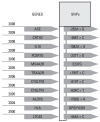Update on recent advances in the management of aspirin exacerbated respiratory disease
- PMID: 20046412
- PMCID: PMC2796398
- DOI: 10.3349/ymj.2009.50.6.744
Update on recent advances in the management of aspirin exacerbated respiratory disease
Abstract
Aspirin intolerant asthma (AIA) is frequently characterized as an aspirin (ASA)-exacerbated respiratory disease (AERD). It is a clinical syndrome associated with chronic severe inflammation in the upper and lower airways resulting in chronic rhinitis, sinusitis, recurrent polyposis, and asthma. AERD generally develops secondary to abnormalities in inflammatory mediators and arachidonic acid biosynthesis expression. Upper and lower airway eosinophil infiltration is a key feature of AERD; however, the exact mechanisms of such chronic eosinophilic inflammation are not fully understood. Cysteinyl leukotriene over-production may be a key factor in the induction of eosinophilic activation. Genetic studies have suggested a role for variability of genes in disease susceptibility and response to medication. Potential genetic biomarkers contributing to the AERD phenotype include HLA-DPB1*301, LTC4S, ALOX5, CYSLT, PGE2, TBXA2R, TBX21, MS4A2, IL10 -1082A > G, ACE -262A > T, and CRTH2 -466T > C; the four-locus SNP set was composed of B2ADR 46A > G, CCR3 -520T > G, CysLTR1 -634C > T, and FCER1B -109T > C. Management of AERD is an important issue. Aspirin ingestion may result in significant morbidity and mortality, and patients must be advised regarding aspirin risk. Leukotriene receptor antagonists (LTRA) that inhibit leukotriene pathways have an established role in long-term AERD management and rhinosinusitis. Aspirin desensitization may be required for the relief of upper and lower airway symptoms in AERD patients. Future research should focus on identification of biomarkers for a comprehensive diagnostic approach.
Keywords: Aspirin; asthma; eosinophil; genetic polymorphism; leukotriene.
Conflict of interest statement
The authors have no financial conflicts of interest.
Figures


References
-
- Yoshida S, Ishizaki Y, Onuma K, Shoji T, Nakagawa H, Amayasu H. Selective cyclo-oxygenase 2 inhibitor in patients with aspirin-induced asthma. J Allergy Clin Immunol. 2000;106:1201–1202. - PubMed
-
- Szczeklik A, Nizankowska E, Duplaga M. Natural history of aspirin-induced asthma. AIANE investigators. European Network on Aspirin-Induced Asthma. Eur Respir J. 2000;16:432–436. - PubMed
-
- Hedman J, Kaprio J, Poussa T, Nieminen MM. Prevalence of asthma, aspirin intolerance, nasal polyposis and chronic obstructive pulmonary disease in a population-based study. Int J Epidemiol. 1999;28:717–722. - PubMed
-
- Mascia K, Haselkorn T, Deniz YM, Miller DP, Bleecker ER, Borish L TENOR Study Group. Aspirin sensitivity and severity of asthma: evidence for irreversible airway obstruction in patients with severe or difficult-to-treat asthma. J Allergy Clin Immunol. 2005;116:970–975. - PubMed
Publication types
MeSH terms
Substances
LinkOut - more resources
Full Text Sources
Other Literature Sources
Research Materials
Miscellaneous

